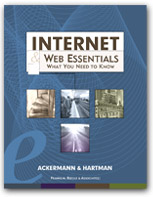This chapter introduced several types of search tools available on the World
Wide Web. These tools—directories and virtual libraries, search engines
and meta-search tools, specialized databases, and intelligent agents—are
all useful ways to find information. Directories, sometimes referred to as
subject catalogs, are topical lists of selected Web resources, arranged in
a hierarchical way. Directories differ from search engines in one major way:
the human element involved in collecting the information and maintaining it.
While search engine databases are created by computer programs, directories
are created and maintained by people. Directories don’t cover the entire
Web. In fact, directories are quite small collections of resources, compared
to the huge databases that search engines search. Browsing directories can
be a very effective way to find the resources you need, especially if you’re
sure where the information you’re searching for would appear on the Web.
Virtual libraries are directories that contain collections of resources
that librarians or information specialists have carefully chosen and have
organized in a logical way. Virtual libraries typically provide an organizational
hierarchy with subject categories to facilitate browsing. The main difference
between virtual libraries and directories is that virtual libraries are much
smaller since the resources included are very carefully selected. The people
who organize virtual libraries are usually on the lookout for three major
types of information: subject guides, reference works, and specialized databases.
Search engines are tools that use computer programs called spiders or
robots to automatically gather information on the Internet and create full-text
databases. Spiders go out on the Internet and locate hyperlinks that are available
to the public. The spiders then load these resources in a database, which
you can then search with the search engine. The major search engines all attempt
to do the same thing—index the entire Web—so they handle a huge
amount of data. Meta-search tools allow you to search several search engines
simultaneously or provide a list of search forms to allow you to search one
tool at a time.
Intelligent agents can perform repetitive tasks like searching databases
and retrieving and filtering information.
The information found on the World Wide Web is diverse and some of it
may be offensive to some people or inappropriate for children. There are software
programs that have been designed to block or filter Web sites that have certain
words in them. There was a movement to force the government to control the
content on the Web and the Internet. The U.S. Supreme Court ruled in 1997
that the Communications Decency Act of 1996 was unconstitutional in that it
abridged the freedom of speech upheld by the First Amendment.
Summary | Terms
| Exercises | FYIs
Agents
(3)
An agent is a program that gathers information or
accomplishes tasks without your immediate presence. Agents are usually given
very small and well-defined tasks. They are also called intelligent agents,
personal agents, or bots. |
Copyright
and Intellectual Property Rights (2)
Copyright is the right to copy or duplicate material
such as images, music, and written works. Only the owners of the information
can grant this right. Regardless of whether information on the Internet
or a Web page is accompanied by a statement asserting copyright, it is still
protected by the copyright laws of the United States, the Universal Copyright
Convention, or the Berne Union. |
Directories
(8)
Some of the most well known directories on the World
Wide Web. A directory is a topical list of Internet resources, arranged
hierarchically. Directories are meant to be browsed, but they can also be
searched. Directories differ from search engines in one major way - the
human element involved in collecting and updating the information. |
Filtering
and Blocking Agents (2)
A filter or blocking agent is software that filters
out or blocks certain Web sites from the results of a search. |
Information
About Directories on the Web (3)
|
Meta-Search
Tools (6)
Meta-Search tools allow you to search either more
than one search engine or directory simultaneously or a list of search tools
that can be accessed from that site. These two major types of Metasearch
tools are called parallel search tools and all-in-one search tools. |
Search
Engine Information on the World Wide Web (4)
Going into some of the details of search engines.
|
Search
Engines (8)
A search engine is a collection of programs that
gather information from the Web,index it, and put it in a database so it
can be searched. The search engine takes the keywords or phrases you enter,
searches the database for words that match the search expression, and returns
the results of the search to you. The results are hyperlinks to sources
that have descriptions, titles, or contents matching the search expression.
|
Search
Tutorials (4)
You may want to use some of these search tutorials
to help sharpen your searching skills. |
Virtual
Libraries (6)
A virtual library is a directory that contains collections
of resources that librarians or other information specialists have carefully
chosen and organized in a logical way. |

